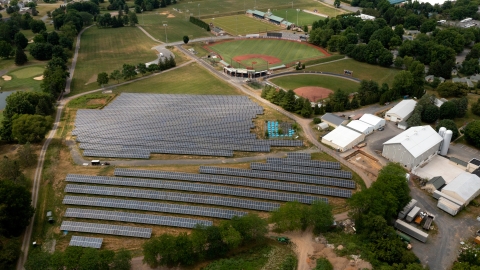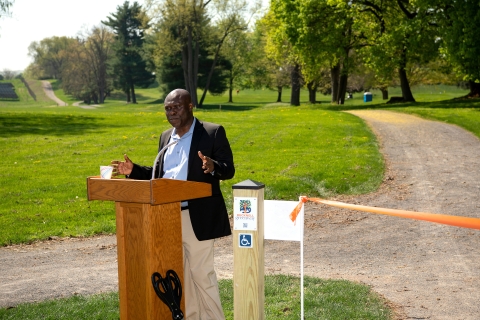
Bucknell Cracks Princeton Review Green Colleges Top 25
December 13, 2023
Bucknell's 1.76-peak megawatt Bison Solar Project. Photo by Emily Paine, Communications
Bucknell University has moved up 15 spots among The Princeton Review's Top 50 Green Colleges to 25th in the ranking, which was released last week. Bucknell made its inaugural appearance in the ranking last year, ranking 40th.
Schools included on the list "share superb sustainability practices, a strong foundation in sustainability education, and a healthy quality of life for students on campus," according to The Princeton Review. Schools are chosen based on a combination of school-reported data and student opinion, via The Princeton Review’s institutional and student surveys.
"We've come together to do a lot as a University with regard to environmental sustainability that is consistent with Bucknell's strategic plan and our 10-year sustainability plan. We continue to strive toward meeting our goal of achieving carbon neutrality by 2030," says Victor Udo, director of campus sustainability. "We're proud of what we've been recognized for through this Princeton Review ranking. We still have much work ahead. We're just trying to do the right thing and make sustainability something we're doing naturally. We're very proud of that."

Victor Udo, director of campus sustainability, speaks at the commissioning of the Bucknell Greenway on Friday, April 21. Photo by Emily Paine, Communications
Udo cites these reasons for the dramatic climb in the Top 50 Green Colleges list:
- The Bison Solar Project is now online and producing electricity daily.
- The University is replacing modular housing units with the West Apartments, four new state-of-art buildings with geothermal heating and cooling.
- University leaders recently commissioned the Bucknell Greenway, which enhances human environment connections/wellness.
- An increasing number of students, faculty, staff, administrators and members of the Board of Trustees are engaging with the Bucknell Farm.
- The University's 10-year sustainability plan is in place and guiding campus green activities.
- Even with the COVID-19 pandemic, Bucknell's STARS Gold rating by the Association for the Advancement of Sustainability in Higher Education (AASHE) increased by over one basis point.
Udo expects Bucknell's rating to continue to rise by the time the University needs to submit its next STARS rating report in 2026. AASHE is the leading association for the advancement of sustainability in higher education.
"AASHE/STARS is a key source of Princeton Review data in addition to surveying the students," he says.
Udo also cited key activities under the President's Sustainability Council Working Groups — carbon neutrality, path to zero waste, ecological conservation/restoration, and environmental, social and governance education — as being valuable in the green campus ranking. These groups continue to pursue sustainable solutions that will reduce waste and carbon emissions. One such solution is a biodigester that diverts pre-consumption food waste from the landfill.
As reported by Second Nature — an organization committed to accelerating climate action in, and through, higher education — the University has reduced its carbon footprint by nearly 30% from its 2008 baseline.

